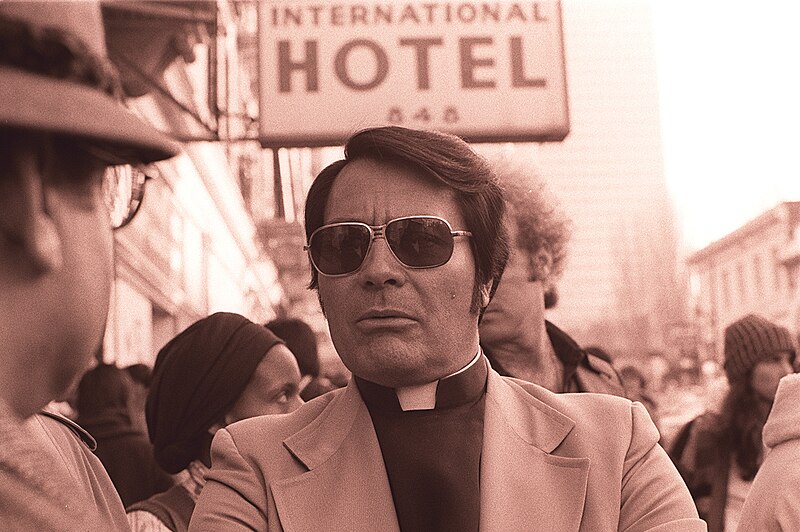 |
| Reverend Jim Jones at a protest in front of the International Hotel, 848 Kearny Street in San Francisco in 1977. Photo by Nancy Wong |
David Brooks feels the Democratic and Republican parties are undergoing a great realignment:
"....he most important social divide today is between a well-educated America that is marked by economic openness, traditional family structures, high social capital and high trust in institutions, and a less-educated America that is marked by economic insecurity, anarchic family structures, fraying community bonds and a pervasive sense of betrayal and distrust.... These two groups live in entirely different universes. Right now each party has a foot in each universe, but those coalitions won’t last."
He goes on:
"Just as the Trump G.O.P. is crushing the Chamber G.O.P., the Clinton Democrats will eventually repel the Sanders Democrats. Their economic interests are just different. Moreover, their levels of social trust are vastly different."
I don't know about Brooks' assessment of the disaffected right. For plenty of them I feel like it has less to do with economic or family realities, and more to do with a cultural, political ideology that creates a narrative of disaffection through its own logic and assumptions. Sure, it is appealing to uneducated, working class whites. But it is nearly as appealing to educated, upper class right-wing whites. The Republican party is hardly the party of the uneducated poor.
There seems to be such an emphasis on economic and social structures giving rise to this movement. While it makes sense, what about the notion that ideas can have a power of their own, and that ideologies can develop in which their own internal rules are self-perpetuating?
Examples of this would be Nazism, Communism, or Anarchism. Each of these movements capitalised on basic economic anxieties, but were much more largely about their own warped ideological assumptions. You might add any extreme movement: hyper-PC, religious fundamentalism. In each what draws people in is some basic anxiety, but it gets twisted into rigid thought control in which self-criticism and skepticism, nuance or flexibility isn't tolerated. There is a constant sense of threat, that there is a sort of war going on in which the "other side" is trying to get you at every turn. Extreme Christians have perfected this, referring to these sort of thoughts as literally being "from the devil".
Of course you have this type of extreme thought on the left. Bernie supporters yelling about Clinton in the convention argued that if Trump had to be elected to prove a point, then so be it. This stance was certainly extreme, and as such came at politics on a war-footing. There are times when injustice is so clear that extreme protest is justified, but favoring a democratic socialist over a moderate neo-liberal in a center-right country isn't one of those times.
But the extreme left is not nearly as ascendant as the extreme right. Much of this is likely due to the reality that academia and media are indeed generally composed of liberals. This allows the left to not feel so attacked, not so paranoid. Liberalism in this sense is indeed more "respectable", and status quo, as Brooks claims. However, the broader public's conservatism, and indeed the business class - whose influence is indeed immense, is just as much the status quo.
So rather than false-equivalency, I feel it important not to ignore the peculiar qualities of extreme right-wing thought that may need some anxiety to get going, but has plenty of timber within its own logic and assumptions to burn brightly. Just like any religion, there are particular, deep human needs which this ideology plays to. Victims of cults or domestic abuse may be more susceptible to begin with, but the intrinsic structure of thought becomes reinforcing. Cult leaders and abusive spouses masterfully manipulate their victims, spinning reality so that 2 + 2 = 5.
So too is the charismatic power of right-wing extreme media. Listening to AM conservative radio is in many ways like attending a cult seminar, or for that matter an evangelical church. Ideas that would otherwise seem preposterous or outright morally repugnant are delivered with a sweet, authoritative charm. And the larger the audience, the more normalized this becomes. The idea that Jews ought be exterminated wasn't hauled out on day one. It was a slow process of getting people used to the idea that the master race needed to be cleansed. Domestic abusers don't start off with intense abuse on the first date. It is a slow process of control and domination. Donald Trump couldn't have said what he says 20 or even 10 years ago. But as the extreme right has ascended in its cocoon of fear and victimization, the space for his ideas was being prepared on airways and internet forums across the country.
By making external excuses for the extreme right, we are excusing its rhetoric of its intrinsic power. Slavery, Jim Crow, segregation and antimiscegenation laws weren't the product of working class resentment, or changing traditional values - however much those anxieties might have helped at various points in time. They were simply bad ideas which had their own internal logic and assumptions, and which were useful in their own right.
No comments:
Post a Comment